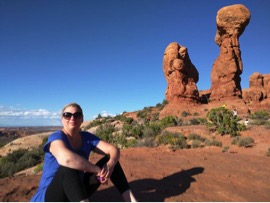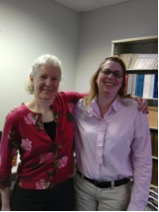Graduate Student Spotlight: Stacy Doore
This month’s graduate student spotlight is Stacy Doore, a PhD candidate in Spatial Information Science and Computing. I caught up with Stacy to talk about SCIS, her research, and even about going to her first Comic-Con in April.
J: So tell me a little bit about what you do here at the School of Computing and Information Science
Stacy: I am a PhD candidate in Spatial Information Science and Engineering in SCIS. Dr. Kate Beard is my mentor, advisor and chair. I work with Dr. Nick Giudice, Dr. Torsten Hahmann, Dr. Reinhard Moratz from SCIS and Dr. Werner Kuhn from the University of California at Santa Barbara. My dissertation title is Representation of dynamic context dependencies in spatial prepositions for natural language indoor scene description and navigation.
Before starting my PhD I received my M.S. in Spatial Information and Science Engineering from SCIS in 2010, where my thesis was titled Modeling a personal exposure history through event-event relationships. I also have undergraduate degrees in Anthropology and Education.

J: Tell me a little bit more about your dissertation. I hear you received funding for your project?
Stacy: My dissertation research is part of a National Science Foundation Cyber Enabled Discovery and Innovation (NSF DCI) grant (Beard and Giudice PI). The grant is investigating and developing support for blind or low vision persons to use a camera as their eyes to obtain images of indoor spaces and convert the imagery to verbal descriptions of the indoor space. My research investigates the framing of these verbal scene descriptions such that they will be useful and reliable for users. This spring I am conducting a sequence of experiments with human subjects to help assess what content and structure contributes to a useful indoor scene description. I have been working with the VEMI lab group to develop the experiment environment, and that has been a great learning experience. I was recently awarded a Michael Eckhardt Dissertation Fellowship for 2016-17 to complete my dissertation research.
J: So what is the major focus of your research?
Stacy: I am interested in the translation process for human-computer interactions. My interest in ontology design and evaluation stems from a desire to create better representations of spatial-temporal knowledge so that both humans and machines can use inference and reasoning to solve practical problems. Improving intelligent system communication about the environment to support human spatial behaviors is one application of this interest, however, I am interested in all aspects of GIScience. Spatial-temporal analysis, spatial epidemiology, spatial cognition and geographic information retrieval are all areas I have explored during my graduate studies.
J: SCIS had an excellent showing at COSIT this year, probably the best of any institution there. How was that experience for you?
Stacy: It was an incredible networking and mentoring experience for me. I presented my pilot study findings entitled Spatial Preposition Specification for Improved Scene Descriptions at the Doctoral Colloquium, and I was awarded a scholarship to attend by the program committee. This session was not included in the published proceedings, but instead it was intended to allow early researchers to present preliminary work to senior level researchers for feedback and advice.
J: I hear that you have done plenty of conference travel during your time with SCIS. Can you tell me a little bit about that?
I have been very fortunate to receive support with scholarships and funding to attend three Vespucci Institutes (two in Florence, Italy and one in Bar Harbor, ME). The Vespucci Initiative is a multi-disciplinary group that organizes research and teaching opportunities to address societal challenges that can be studied through the lens of Geographic Information Science. The most recent institute in June 2015 celebrated the 20th year of the International Early Career Scholars Institute in GIScience. My team of early career scholars won the final research challenge with a winning mock National Institute of Health (NIH) proposal. The team included myself and Matt Dube from UMaine as well as J-K. Kang and S. Zhong from the SUNY Buffalo Department of Geography and the National Center for Geographic Information and Analysis (NCGIA).
J: Tell me about some of the work that you have done here on campus
Stacy: I work as an Internal Evaluator for ADVANCE Rising Tide. The NSF ADVNCE program funded a large grant at UMaine that has worked to improve recruitment, retention and advancement of women faculty in STEM and SBS (social behavioral sciences). The leadership of Rising Tide program has worked to improve campus climate for all faculty but in particular for women faculty in male dominated disciplines by offering professional development in the elimination of gender bias, increase diversity in faculty search applicant pools, improving work-life balance policies, and mentoring for all stages of the academic career. In May, I will be traveling to Baltimore to represent UMaine’s ADVANCE Rising Tide program at the Association of Women in Sciences (AWIS) ADVANCE workshop. I have organized a session with four other ADVANCE universities on evaluation and research in measuring institutional transformation.
I have also run workshops for middle and high school girls on spatial informatics and computer science for many years as a part of different UMaine STEM outreach programs such as Expanding Your Horizons, 4H STEM days, Hardy Girls/Adventure Girls. As an NSF GK-12 Fellow, I co-developed and taught the only high school course in GIS in the state from 2007-2010 at Bangor High School. This course was designed to bring more computational thinking, research methods and computer skills into the geography curriculum as well as engage more high school girls in considering engineering and computer science as a career path. In 2009, we developed a graduate level course I co-taught in the College of Education and Human Development on using GIS as a research and analysis tool in middle and high school classrooms.
J: That sounds like it keeps you busy. What else would you like to do here at UMaine?
I would like to establish a NCWIT LeanIn circle for women in the computational sciences at UMaine (graduate and faculty) and a chapter of the ACM-W in SCIS. I have applied for a scholarship to attend the Anita Borg Institute’s 2016 Grace Hopper Celebration in Houston, Texas. This is a large research and networking conference for women in computer science from around the world.

J: What do you like to do in your free time, outside of the University of Maine?
Stacy: I love to spend time with family and friends, who are an amazing support network. There is not a lot of time for personal hobbies between working, dissertation research and parenting but I do fit in a yoga class whenever I can in order to maintain my sanity. Last summer, my family and I drove across the country from Los Angeles to Bangor visiting 12 National Parks and monuments along the way. It was a great chance to see the country and camp with our kids.
I love Sci-Fi and Fantasy movies, such as Star Trek, Star Wars, Firefly, and the X-Files. I just read Margaret Atwood’s The Heart Goes Last and I now am working on Salman Rushdie’s Two Year, Eight Months and Twenty Eight Nights. My middle school age daughters are really into comic books with strong women characters, so I will take them to the local Comic-Con in April, which will be a new experience for me.
J: Anything else you would like to add?
Stacy: I think it unfortunate that there are so few women graduate students (at any level) in SCIS. According to our website, I am currently the only PhD student, who is also a woman. Kate Beard and the NSF ADVANCE leadership team have been incredible mentors for my early academic career development. I would like to help SCIS grow a stronger contingent of women researchers and graduate students in order to provide a larger pool of role models and mentors for young women who are considering computer science as a career path. Working with people in your field that you can identify with is really important to believing you belong in this discipline. I would love to work with our SCIS faculty to continue to address this issue.
